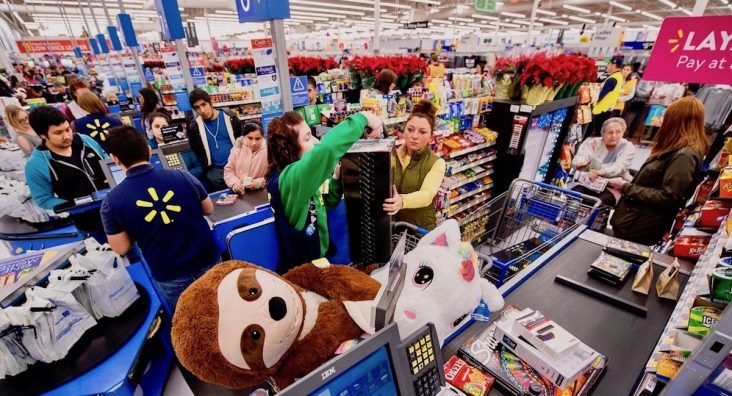Deloitte: Consumers reimagine Thanksgiving shopping traditions amid COVID-19
by November 23, 2020 3:17 pm 522 views

(photo courtesy of Walmart Inc.)
Thanksgiving 2020 won’t be like other years, as consumers will not be rushing out to stores to shop as soon as they have finished their turkey dinners.
Deloitte estimates consumers will spend an average of $401 during the Thanksgiving shopping period (Thursday, Nov. 26 – Monday, Nov. 30.) Shoppers plan to spend 38% of their holiday budget in-store and 62% online this year.
Black Friday, the day after Thanksgiving, has been lengthened this year by retailers, and consumers have already started shopping well ahead of Thanksgiving.
Amazon postponed Prime Day from July to October, which is also believed to have siphoned away some Black Friday shopping demand.
“As COVID-19 brings added health and financial concerns, both consumers and retailers are reimagining Thanksgiving shopping traditions. This Thanksgiving period, shoppers are interested in two things — getting a good deal on items and feeling safe — and this is driving significant changes in how they approach the season. Also, with nearly one-third of consumers not having firmly decided on where to shop for specific items, those retailers that prioritize safety precautions, for both the customer and employees, are likely to win this holiday season,” said Rod Sides, vice chairman and U.S. retail, wholesale and distribution leader for Deloitte.
The survey found that 95% of consumers who plan to shop during the Thanksgiving weekend will shop online. Nearly one-third of consumers plan to shop fewer days this season, and the main reason cited is concern about COVID-19 by 63% of respondents. These concerns already impact consumers’ holiday shopping plans. Health officials have advised consumers not to travel this holiday, nor are families supposed to congregate in groups of more than ten people, and masks are also recommended.
Deloitte said as health and safety concerns arise, consumers are also not traveling this holiday season; 65% of respondents will travel less or not at all.
The 2020 survey was also the first time in history that more consumers (61%) plan to shop online rather than in-store on Black Friday. As online shopping increases, Deloitte found that 52% of consumers say the variety of delivery options for orders is very or extremely important, up from 44% last year. However, nearly two-thirds (65%) of online shoppers prefer standard delivery via post or courier service.
For those shopping on Black Friday, COVID-19 safety precautions are almost of equal importance to getting a great deal (30% and 35%, respectively).
Throughout the Thanksgiving period, 75% of survey respondents said COVID-19 safety precautions are essential when choosing a retailer. While social traditions and how shoppers are purchasing gifts are different, Deloitte expects spending in the clothing, electronics and toy categories to remain steady this year.
Deloitte said as consumers become increasingly anxious about COVID-19, they are reimagining holiday activities, from shopping to traveling.
While the Thanksgiving shopping period is traditionally a group activity, 61% say they are unsure of their plans or have no plans to shop together (up from 48% in 2019).
In fact, 57% of shoppers are anxious about shopping in-store during the holiday season due to COVID-19. Deloitte also found those with the most concerns about shopping in stores will spend less ($386) than those without those concerns ($477). The biggest reason some consumers are planning to spend less is because of a general concern about the economy or their own worsening personal or household financial situations, Deloitte reports.
“Many consumers started their holiday shopping earlier than they have in the past because of Prime Day and other retailers’ promotional events. Traditionally, those who start shopping earlier tend to spend more over the holiday season, which is good news for the retail industry overall. However, as shoppers look to minimize their in-store visits, mass and online retailers are likely to come out on top as they offer a one-stop-shop for consumers purchasing gifts along with their essential purchases, like hand sanitizer or groceries,” said Jeff Simpson, principal at Deloitte Consulting.
NRF HOLIDAY FORECAST
The National Retail Federation also released its estimates for holiday sales on Monday. The trade group is at least two months late in making this prediction as it chose to wait until after the elections and the Amazon Prime Day event to weigh in. The NRF forecast that includes sales during November and December indicates sales growth between 3.8% and 5.2% this year over 2019. The total estimate between $755.3 billion and $766.7 billion excludes automotive dealers, gas stations and restaurants.
“We know this holiday season will be unlike any other, and retailers have planned ahead by investing billions of dollars to ensure the health and safety of their employees and customers,” NRF President and CEO Matthew Shay said.
“Consumers have shown they are excited about the holidays and are willing to spend on gifts that lift the spirits of family and friends after such a challenging year. We expect a strong finish to the holiday season and will continue to work with municipal and state officials to keep retailers open and the economy moving forward at this critical time,” he added.
NRF expects that online and other non-store sales, which are included in the total, will increase between 20% and 30% to between $202.5 billion and $218.4 billion, up from $168.7 billion last year.
